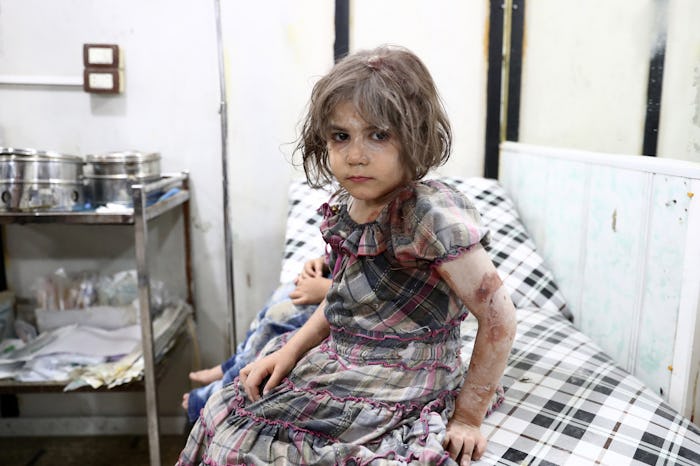News

One In Three Syrian Children Only Know Life During War, & Here’s How You Can Help
The recent video footage of 5-year-old Omran Daqneesh called the world's attention to the plight of children in Syria, where civil war has been raging for the last five years. In fact, according to NBC News, one in three Syrian children only know war, having been born after the conflict started in 2011. They've grown up literally playing in rubble, watching their homes be destroyed, and being evacuated from children's hospitals as their own government bombs them. The New York Times reported that Omran's doctors, and the photo photographer who shot the video of him, are surprised that he garnered so much attention, as his story is quite typical of those in the region. Omran's 10-year-old brother, Ali, was also injured in the Aleppo bombing and died as a result of his injuries on Saturday. Few people noticed.
And things aren't much better for the children who manage to escape Syria. The common alternative is paying to be smuggled to detention centers in Greece, where refugees are treated worse than criminals, fenced in with barbed wire, and provided with inadequate food, shelter, education, or medical care. Some report that they've been out of school for so long, they've forgotten how to read, according to CNN. Nearly one-third of refugees crossing the Mediterranean into Europe are children, according to the United Nations, and those are just the ones that survive the journey.
There are ways to help, though. UNICEF has been hard at work assisting Syria's 8.4 million children since the conflict began, providing food, water, education, and medical care in what it refers to as "the largest humanitarian operation in history." UNICEF noted that more than 15,000 unaccompanied children have left Syria since 2011, leaving them vulnerable to abuse, exploitation, and trafficking. 90 percent of funds donated to UNICEF go directly to helping children. Helping Hand for Relief and Development is also working with refugees, sponsoring more than 1,500 orphans and providing food, shelter, and education.
The hardest to help are those still within Syria's borders. Humanitarian aid convoys have been denied access to the country for the entire month of August, according to the Washington Post, and supplies are running dangerously low, particularly in Aleppo, the epicenter of the violence. The United Nations Special Envoy Staffan de Mistura has been calling for a 48-hour ceasefire, and Reuters reported last week that Russia (who supports the Syrian government's regime) said it will agree to a temporary truce. The United Nations High Commissioner for Refugees and Save the Children both have trucks ready to roll as soon as a ceasefire commences, and both welcome donations.